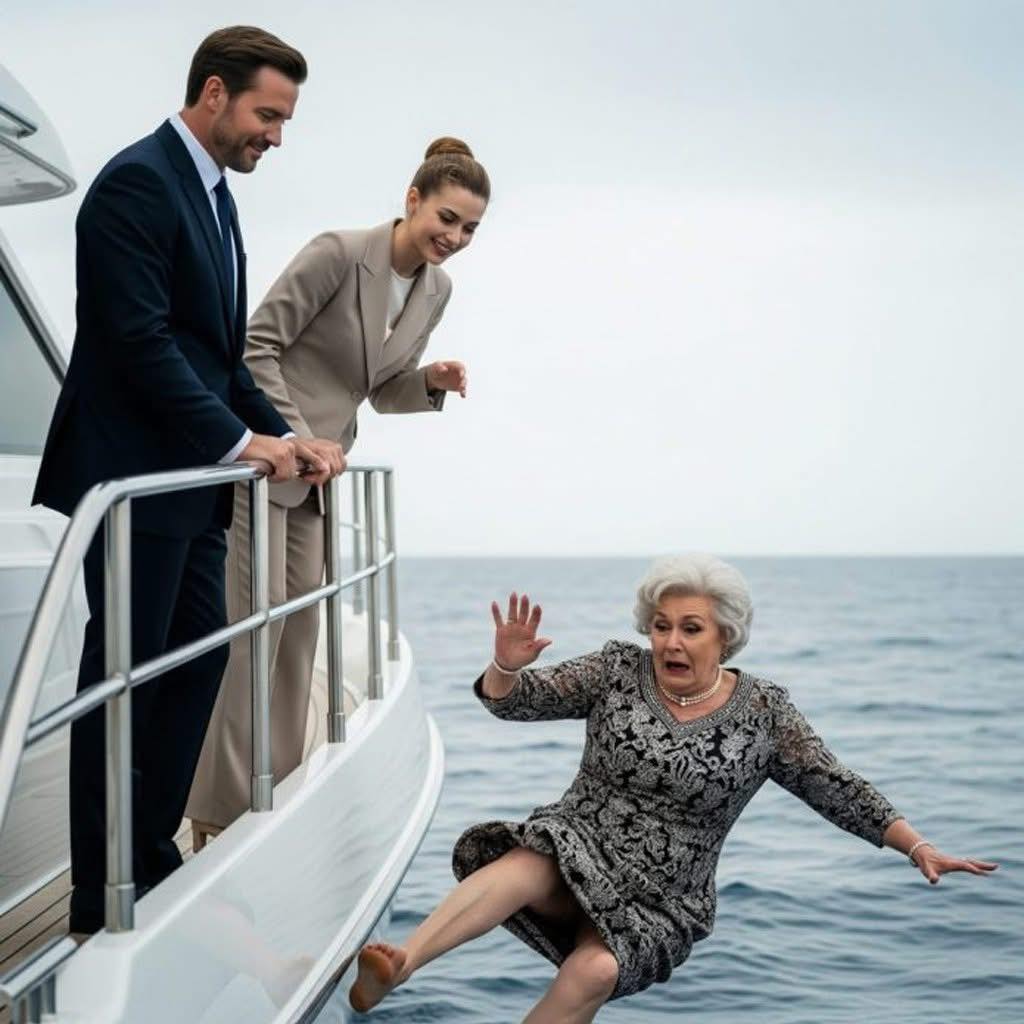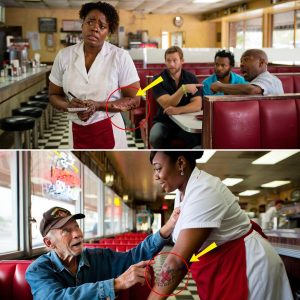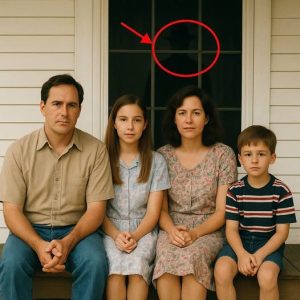“‘Time to meet the sharks,’ my daughter-in-law whispered before she shoved me overboard. My son watched, smiling, as the sea swallowed me. Their goal? To claim my ten-million-dollar fortune. But when they returned to the mansion, triumphant, I was waiting for them — with a ‘gift.’
‘Say hello to the sharks,’ my daughter-in-law whispered as she pushed me off the yacht. The Atlantic closed over me. I watched the blue sky fade away above me, replaced by the cold suffocation of seawater. When I struggled to surface, coughing and gasping for air, I saw them one last time: my son Michael and his wife Evelyn, calmly leaning on the rail, champagne glasses raised in a toast.
They thought I was done for.
At seventy-one, I was no longer the spry sailor I had been, but years of swimming every morning in Cape Cod had taught me how to endure the sea. My lungs burned as I rowed, but survival was nothing new to me. I had worked my way up from the son of a construction worker to a real-estate magnate with a net worth of over ten million dollars. And now my own blood had thrown me overboard like unwanted trash.
For years I suspected that Evelyn’s smile hid more calculation than warmth. She was all designer dresses, Instagram dinners and whispers of “plans for the future.” Michael, my only son, had drifted since college, softened by luxury. I told myself he would toughen up, become the backbone I once carried in my back pocket. But that night, under the yacht’s lights, I realized he had chosen his backbone: Evelyn.
Salt stung my eyes as I swam toward the faint silhouette of the shore. The distance was brutal, but my anger ran stronger than the tide. Each stroke was fueled by betrayal. By the time I reached the rocky beach hours later, my muscles screamed, but my mind was keener than it had been in years.
If they wanted me gone so they could have my fortune, fine; let them savor their victory. But when they walked into my mansion, dripping saltwater and pretending to mourn, they would find me waiting. And I would not simply confront them. I would give them a ‘gift’ they would never forget…

I had been planning my little “gift” for weeks — not because I was clever, but because I’d spent a lifetime learning that the quietest men can be the most dangerous when pushed. I walked back into my mansion two days after they’d toasted my death, salty clothes clinging to me like a reminder, hair still gritty with sea. I didn’t hurry. I rang the bell. I brewed coffee. I straightened a cushion. I wanted them to arrive thinking they had already won.
They came in at dusk, triumphant smiles gone brittle from nerves. Evelyn’s makeup ran a little, Michael’s smile kept sliding off like a bad mask. They expected tears, a will, champagne. What they found instead was me—standing at the bottom of the main stair in a robe I hadn’t worn in years, palms folded, expression calm as old wood.
“You two look dreadful,” I said, and they froze, incredulous.
Evelyn recovered first. “Dad—Michael—what—how—” Her mouth worked like a fish’s.
I didn’t answer. I reached into my pocket and pressed play.
A screen flickered on in the sitting room. The yacht. Their voices—laughing, the rings of champagne, the careless toast. Evelyn’s whisper: “Time to meet the sharks.” Michael’s chuckle after: “Easy. We’ll sign the papers, take the accounts.” In the background, a muffled thump—something like a scuffle. Their faces chilled as their own voices betrayed them.
“Where did you get that?” Michael stammered.
“From the little camera I had my boat mechanic install under the rail two nights ago,” I said. “Remember when you said you trusted me to check the yacht? I made sure the cameras were far better at remembering things than I am.”
Their faces went from pale to grey.
“Also,” I continued, “I called my lawyer the moment I didn’t wake up. I filed an emergency injunction—assets frozen pending investigation—based on reasonable suspicion of attempted murder. My bank favors local procedure. I put the accounts on temporary hold. The papers are on the coffee table.”
Evelyn lunged for the tablet, hands shaking, but I held up a hand. “You wouldn’t want to destroy the evidence now, would you? The police are already on their way. Isabelle from the harbor just texted: they found the lifebuoy we never used, with fingerprints. Your friend at the marina was less clever than he thought.”
Michael’s knees hit the rug. He looked like a man whose scaffolding of ease suddenly collapsed. “Dad, I—” he began, voice thin.
“You tried to drown me because you wanted my money,” I said, feeling neither heat nor triumph—only an old, plain sorrow. “You chose the champagne over your father.”
Evelyn’s face crumpled. “We… we needed the money. Debts—investors—” Her words tumbled out uselessly, like coins from a torn pocket.
“Needed,” I echoed. “So you made a choice to erase me.”
The sirens came first as a distant wail, then closer—police lights throwing colors through the stained glass. Two officers stood in the doorway within minutes, polite but businesslike. They produced a warrant, headphones, cuffs. I handed the recording over without fanfare. Isabelle arrived, nodding curtly, and took Evelyn and Michael aside.
“You can cash your triumph in court,” she said, low. “But for now, you’re under arrest for attempted homicide and conspiracy.” The words landed like hammers. Evelyn began to sob; Michael’s hands went to his face.
I watched them being led away—the son I’d built a business and family with, the woman he’d chosen—both reduced to shuffling cuffs and statements. There was no shouting, no vicious theater. Just the awful, cold sequence of consequences catching up.
Then I went to the study. I signed a new set of papers I’d prepared before going to sea: a revised will revoking certain powers I’d foolishly given them and setting up ironclad trusts. The bulk of my liquid assets—my accounts, my portfolio—went to a charity we’d sponsored quietly for years, to the employees of my companies, and to the small clinic in Cape Cod that had patched me up more times than I can count. A modest, managed allowance was left for Michael—enough to live, with strict oversight and counseling required as a condition. Evelyn’s name vanished from anything that would give her access to money.
On my desk lay the real “gift.” A simple wooden box addressed to them both. Inside: a brass plaque shaped like a shark’s fin engraved with three words—
“You met the sharks.”
It was a tastefully bitter joke. I left it on the mantel with a note: “Consider this a souvenir. May it teach you what you taught me.”
People who’d known me all my life would’ve expected a different revenge—lawsuits, public scorning, a duel of lawyers. But I wanted them to feel what I had felt: the slow, cold certainty that someone you trusted could choose your end for their gain. I wanted them to wake up in a cell and not in a mansion, to sit with their choices and the people they’d betrayed.
The next morning, as the papers and the net filled with the story—billionaire’s attempted murder foiled by cameras—I walked down to the shore. The sea was calmer now. I laid my robe on a rock and watched the horizon like I had for fifty years. I didn’t gloat. I didn’t laugh. The justice that came was clinical, tidy, the way accountants might like it. The law would do its part; remorse, if it ever came, would be their work.
Later, as the case was prosecuted, Michael and Evelyn pleaded guilty to the lesser counts. They spent months in court and, eventually, time in a facility where their privileges were pared down to basics. They lost access to the wealth they’d schemed for; more painfully, they had to wrestle with the faces of the people they’d betrayed.
As for me, I kept the mansion—not from a grasping heart, but because it was where I’d raised my hands, built my life, and intended to let my days unfurl. I used what I could salvage to make amends where I had failed: I increased the pension for my employees, completed the wing at the clinic, and set up a fund for men and women who’d been tempted to buy security at the cost of their souls.
On quiet mornings I still went out in the little boat, not to prove anything but to keep the rhythm of my days. Once, watching the sunrise turn the water molten gold, I saw a gull dive for a fish and rise again with its prize. Survival had never been about revenge for me. It was about refusing to be swallowed.
They had hoped the sea would finish me. Instead, the sea sharpened me. Their gift—their greed—had returned to them in a way I never would have wished on anyone, and yet it taught them the final lesson: that some fortunes cannot be claimed by force, only forfeited by folly.
I never wanted their ruin. I only wanted, finally, to be left in peace. And when the legal dust settled and the house quieted, that was what I had: a good morning, a boat on the water, and the knowledge that I was the author of the rest of my days.





